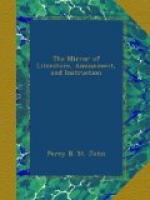We need not cross the sea for examples of this kind, we have too many (God wot) at home: King James a great while was loth to believe there were witches; but that which happened to my Lord Francis of Rutland’s children, convinced him, who were bewitched by an old woman that was servant at Belvoir Castle, but being displeased, she contracted with the devil, who conversed with her in form of a cat, whom she called Rutterkin, to make away those children, out of mere malignity, and thirst of revenge.
* * * * *
A RICH MAN.
“Among the many and various hospitals,” says Sir William Temple, “that are every man’s curiosity and talk, that travels their country, I was affected with none more than that of the aged seamen at Enchuysen, which is contrived, finished, and ordered, as if it were done with a kind of intention of some well-natured man, that those who had been their whole lives in the hardships and incommodities of the sea, should find a retreat with all the eases and conveniences that old age is capable of feeling and enjoying. And here I met with the only rich man that I ever saw in my life—for one of these old seamen entertaining me a good while with the plain stories of his fifty years voyages and adventures, while I was viewing the hospital and the church adjoining; I gave him, at parting, a piece of their coin, about the value of a crown; he took it and smiled, and offered it me again; but when I refused it, he asked me ’What he should do with money?’ I left him to overcome his modesty as he could; but a servant coming after me, saw him give it to a little girl that opened the church door, as she passed by him; which made me reflect upon the fantastic calculation of riches and poverty that is current in the world, by which a man that wants a million, is a prince; he that wants but a groat is a beggar; and this was a poor man that wanted nothing at all.”
* * * * *
THE GATHERER.
Nicknames.—John Magee, formerly the printer of the Dublin Evening Post, was full of shrewdness and eccentricity. Several prosecutions were instituted against him by the government, and many “keen encounters of the tongue” took place on these occasions between him and John Scott, Lord Clonmel, who was at the period Chief Justice of the King’s Bench. In addressing the court in his own defence, Magee had occasion to allude to some public character, who was better known by a familiar designation. The official gravity of Clonmel was disturbed; and he, with bilious asperity reproved the printer, by saying,—“Mr. Magee, we allow no nicknames in this court.” “Very well, John Scott,” was the reply.
H.S.S.
* * * * *




